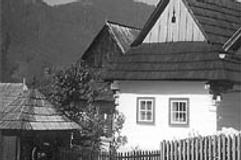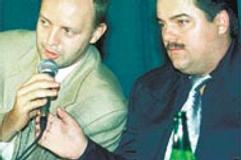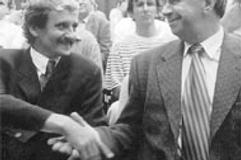Archive of articles - August 1998
If you desire to read an old article, use the search bar or select the publication date.
New Program for the Minorities at STV
A programming change at the state-run Slovak Television (STV) has reduced the time allotted to Hungarian language programs from one hour per week to half an hour every fortnight. STV officials say the change will allow the station to carry minority programs from Slovakia's other ethnic groups, but the Hungarian community is calling the decision politically motivated."Starting from September, STV will finally start broadcasting a new minority program called 'They Live With Us,' which will honor the twelve minorities living in Slovakia," said Martin Petrenko , chief editor of STV's Documentary Section. "This special weekly broadcast will last half an hour each Saturday , and will introduce the various nationalities by their own spoken language with Slovak subtitles."
Army snafu: Two chiefs of staff struggle for power
"Those planning to mar my commands or not comply with laws will be prosecuted."General Jozef Tuchyňa A soldier standing outside the Slovak Defense Ministry leaned over and asked a whispered question. "Who's in charge?"Told that Slovak Army Chief of Staff Jozef Tuchyňa was still the highest military authority in the land, the soldier nodded, a grim smile on his lips. "That's good," he murmured. "I stand behind Tuchyňa and his leadership."Only hours earlier, on August 19, Slovak parliamentary speaker Ivan Gašparovič had recalled Tuchyňa and appointed a new chief of staff. The new man, Colonel Marián Mikluš, was immediately assailed by Tuchyňa and Slovak political opposition parties as an inexperienced candidate who had been illegally nominated.
Vlkolínec - rustic life in an open-air museum
That people still live in Vlkolínec may come as a suprise - one of Slovakia's best-preserved historical sites, the tiny village has few of the conveniences that modern city-dwellers take for granted. But amidst its stunning natural surroundings, and as a UNESCO World Heritage Sight, Vlkolínec offers a picturesque glimpse into a uniquely Slovak past.Accessible by car, via the E77 main road, or on foot via 20-minute hike on the yellow trail from the Malino Brdo ski area, Vlkolínec sits at 718 meters above sea level. The village's name derives from the Slovak word for wolf (vlk), a reminder of the wolves which once howled in the nearby mountains.The trail from Malino Brodo crosses between two peaks and then plunges down a forested hillside. The first glimpse hikers get of the village is a fairytale log cabin perched on an embankment to the right. This Hansel and Gretel set-piece is served for water by a piece of garden hose propped on a forked stick.
Opposition united on economic cures, government parties demur
István Harna, an economic expert with the Party of the Hungarian Coalition (SMK), said he felt that his party's economic program had always been overshadowed by the SMK's ethnic orientation. "The current government accused us of dealing with ethnic problems exclusively," he said, "but we are interested in solving all problems, with extra emphasis on minority issues."For Harna, the main thrust of the SMK's economic programme was to use increased FDI to jumpstart Slovakia's deteriorating economy. "One of the goals of the next government should be an attempt to reduce the gap between Slovakia and western economies," he said, "and try to reach the status of the countries in the first wave of EU integration process."Calling the current economy "dysfunctional," Harna proposed radical restructuring aimed at making the export sector more competitive.
HZDS rests on past laurels
With national elections less than a month away, Slovakia's strongest political party has declared itself satisfied with the economic results of the last four years, and is forecasting no major economic policy changes if its wins the September 25-26 vote.In an exclusive interview for The Slovak Spectator, deputy Premier Sergej Kozlík explained that the economic plan of Premier Vladimír Meciar's Movement for a Democratic Slovakia (HZDS) "will be the same as our plan has been until now. We will continue with the further transformation of the economy, so that step by step we become a country with a market economy."Kozlík, a former Finance Minister in the current Mečiar government, said that the HZDS deserved credit for reining in its fiscal policy, and would continue to control government spending after the elections.
SDĽ adopts business-friendly policy
Slovakia's main left-wing party, the former communist SDĽ, has prepared an economic plan of action for the country that bears little trace of traditional socialist thinking. Following the example of Great Britain and the US, where left-wing parties have adopted many of the policies of the right, the SDĽ advocates reduced government spending, tax breaks for small and medium enterprises and lower interest rates as the best way to turn the economy around.Brigita Schmögnerová, the SDĽ's vice-chairperson and resident economic expert, outlined her party's economic policy for The Slovak Spectator."In the first month of the new government we will try to consolidate the economy," Schmögne-rová said. "We are concerned mostly about the growing current account deficit and the growing fiscal deficit." The first areas of concern, she explained, would be "some big changes in exchange rate policy," as well as reviving sectors such as "the healthcare and transportation industries, which are very close to collapse."
TV Markíza sold from under feet of boss
"Rusko is a man to lead a cavalry charge against tanks."Source close to CMEIn a coup-like raid on August 18, more than twenty armed men from a private security service invaded the Bratislava premises of Slovakia's most popular private TV station, TV Markíza. Four of them burst into the office of Pavol Rusko, the station's General Director and co-owner. "They disconnected my phone, pushed me into a room and announced it," said Rusko.'It' turned out to be an injunction issued by Bratislava Regional Court the previous day, forbidding Rusko to execute any of his rights as legal representative of Markíza. The bearer of the bad tidings was Marián Kočner, co-owner of a company named Gamatex that had hired the security guards and had quietly bought out Rusko's share of the station. The court order that Kočner held effectively stripped Rusko of his ownership rights.
SDK survives court challenge
As hundreds of onlookers waited tensely outside, the Slovak Supreme Court quashed an appeal by Prime Minister Vladimír Mečiar's Movement for a Democratic Slovakia (HZDS), and on August 14 allowed the largest opposition party in the country to register for national elections.Mečiar's party had been appealing an August 10 decision by the Central Election Commis-sion to allow the opposition Slovak Democratic Coalition (SDK) to contest national elections set for September 25 and 26. In its legal brief, the HZDS said that the SDK should not have been registered because it was not a real party, and said it wanted the party to be re-registered as a coalition.But Supreme Court Chief Justice Štefan Harabin said in his official ruling that "the approval of the SDK's registration was done in accordance with the law," and added that "the Supreme Court can only judge the registration [question], it cannot judge the character of a political party."
Slovakia book now available on CD
At the beginning of September, Slovakia's independent Institute for Public Affairs (IVO) will release a CD Rom version of Slovakia 1997, the Institute's influential collection of analytical essays on Slovak affairs."The aim is to distribute the CD Rom free of charge to foreign journalists who are coming to cover the elections," said Richard Rybníček, executive director of IVO.The CD Rom is based on a book which comprises 24 essays on problematic issues in Slovak cultural, economic and political life. The electronic version offers the added advantage of a subject search, which allows users to hone in on references to a specific issue. The electronic medium will also contain IVO's latest publication, a study of Slovak public opinion called Democracy and Discontent in Slovakia.
Vandals and scandals: Billboard graffiti depicts voter impotence
Billboards advertising the virtues of the governing party in Slovakia, the HZDS of Premier Vladimír Mečiar, have been defaced across the country by spray-painting vandals. More than anything else, these acts symbolize the impotence citizens feel at the latest wave of privatization deals and institutional putsches the government has staged."Come with us," the HZDS urges on a billboard in Bratislava. "To Russia," a graffiti artist has added. "To hell" writes another."We've shown it together," the HZDS insists. "How to steal," comes the answer. "Don't be afraid of heights," voters are told - "fear Mečiar instead," is the rejoinder
Foreign banks hedge exposure during turmoil, elections
The Slovak money and foreign exchange market experienced very a interesting development over the last two weeks. The Russian financial turmoil prompted foreign investors to sell Eastern Europe currencies. This trend finally made an impact even on the Slovak currency.Offshore interest in Slovak financial markets rose, while the crown slid through the 3% level on the weaker side of its +-7 percent basket band on the 10th of August. The largest move was recorded on the 11th, when the crown lost more than 1% within a day. Even the key barrier of 4% was broken effortlessly, as the National Bank(NBS) did not intervene in its daily fixing.
Public stations less objective than private
The press monitoring group MEMO 98 released findings on August 13 to show that Slovakia's state-owned media stations are less objective than the country's private channels."It is a big paradox that public media do not have as balanced a coverage of political parties as do some of the private ones," said Anna Nogová, one of three people organizing the MEMO project, which is funded by the Helsinki Civic Assembly and the Union for the Support of Local Democracy.The survey results covered the time period from July 13 to August 9, and included Slovakia's top five daily newspapers (Nový Čas, Sme, Pravda, Práca and Slovenská Republika), the two biggest TV stations (the private TV Markíza and the state-owned STV) and two radio stations (private Rádio Twist and public Slovenský Rozhlas).
Economic time-bombs await fresh government solutions
The Slovak Spectator asked Slovakia's most prominent market analysts what economic problems the next government would face, and then asked the country's top six parties what they planned to do. Here's what they said:While Slovak politicians gear up for September's election campaign, the country's economic problems are steadily worsening and threaten to plunge a new government into crisis. Business and economic experts say that whatever party wins the elections, years of economic hardship await Slovak citizens.Among the most troubling aspects of the stagnating Slovak economy, say analysts, are a dysfunctional financial system, a soaring current account balance deficit, a runaway fiscal deficit and industrial inefficiencies caused by a corrupt privatization process.
August '68 - then and now
Thirty years ago, on August 21st, the Soviet Red Army together with soldiers from other socialist countries - the People's Republic of Poland, the German Democratic Republic, the People's Republic of Hungary and the People's Republic of Bulgaria - invaded the Czechoslovak Socialist Republic. At that time, the country was experiencing its 'Pražská jar' (Prague Spring) period, which tried to reform hard-line socialism into "socialism with a human face" under the leadership of Alexander Dubček, a Slovak by birth.The Presdium of the Communist party told all citizens of the Czechoslovak Republic to "remain peaceful and not resist the invading armies." The invaders stayed for over 20 years.In August 1968, a new period began in the Czechoslovak Republic, and nothing was ever the same again. A long period of 'normalization' began, under the hard-line Communist leader Gustáv Husák. Below, politologist Samuel Abraham, Slovak Premier Vladimír Mečiar, the daily Czech newspaper MladaFronta Dnes and Slovak opposition leader Milan Ftáčnik give their views of what happened in 1968 and what it means in 1998.
Lawsuits surround Slovenská poisťovňa privatization
The bitterly contested increase in the basic capital of Slovakia's biggest insurer drew to a close on August 21, as the owners of Slovenská poisťovňa confirmed that the state property fund's (FNM) stake in the company had dipped below that of private shareholders.The capital increase had caused a storm of controversy around the country because it meant the de facto privatization of SP, one of Slovakia's healthiest financial institutions. Opposition parties launched a series of lawsuits, saying that in not participating in the stock subscription, the FNM had allowed its share to be diluted and thus had violated the law on privatization of strategic companies.Other opposition politicians warned the privatization party may not be over yet. Brigita Schmögne-rová, vice-chairwoman of the former communist SDĽ party, said that Slovenská sporitelňa, the country's biggest bank and savings institution, might be privatized by a means similar to Slovenská poisťovňa - via a capital increase.
'Best of Europe' Internet awards dismissed as advertising gimick
Richard Rybníček, executive Director of theInstitute of Public Affairs, was delighted to discover in mid-August that his foundation's web site had been awarded a 'Best of Europe' designation. Although slightly mystified as to the identity of Europe Online, the company who had bestowed the honor, Rybníček was in no doubt as to the merits of his company's web page.But as the days passed, it became apparent that the Institute was not the only 'Best of Europe' web site in town. The Ministry of Culture, the Slovak press agency SITA, ABC Internet, MA-REK Agency and many others came forward to present their new credentials as Europe's Best sites. As it turned out, almost 450 Slovak web pages had received the same e-mail award.
Political parties using Internet for first time
For the first time, the Internet is playing a role in Slovakia's electoral process, as most of the country's major political parties are using the Web to reach out to young voters unimpressed by more traditional styles of campaigning. Web pages and chat lines, where voters can discuss issues with politicians on-line, have won praise from both particpants and observers as a cheap and effective way to campaign."It is a great thing, especially for young people," said Oľga Pietruchová, Internet specialist for the Party of Civic Understanding (SOP) . "The Internet campaign is a good opportunity for young, first-time voters to find answers to their questions and then afterwards decide who to vote for. It's also more comfortable and much easier to ask questions while sitting behind the computer [hooked up to a chat line] than raising a hand at a meeting, "added Pietruchová.
- Pastoral letter divides Slovaks
- News digest: Slovakia is being hurt by its failure to integrate foreign workers, says auditor
- Hollywood turns Slovak highlands into high-speed playground Video
- News digest: ‘Charlatans and quacks’: Pandemic investigator accuses scientists, pushes for jab ban Video
- Authoritarian echoes from Delhi to Bratislava
- Top 10 events in Bratislava for foreigners
- A café in an ice cellar, sand dunes and a flower shop at the border
- Forget the spa – Bojnice’s trails are the real therapy Photo
- A café in an ice cellar, sand dunes and a flower shop at the border
- Top 10 events in Bratislava for foreigners
- Bratislava opens new support centre for foreigners
- News digest: ‘Charlatans and quacks’: Pandemic investigator accuses scientists, pushes for jab ban Video
- You say nazdar, I say dovi
- Pastoral letter divides Slovaks
- Neuroimmunologist Norbert Žilka: Slovakia in Alzheimer's research premier league
- Hollywood turns Slovak highlands into high-speed playground Video
- Bratislava opens new support centre for foreigners
- Hollywood turns Slovak highlands into high-speed playground Video
- You say nazdar, I say dovi
- A café in an ice cellar, sand dunes and a flower shop at the border
- Top 10 events in Bratislava for foreigners
- Independent cultural space on Bratislava embankment to end soon
- Záhorie uncovered: Slovakia’s quiet corner full of surprises Photo
- Chicken Jockey! Chicken Jockey! Chicken Jockey! Video
- Last Week: And then they came for the NGOs
- What abides: Giving a shit
- Slovakia brings back border checks with Hungary and Austria starting April 8
- Bratislava opens new support centre for foreigners
- Hollywood turns Slovak highlands into high-speed playground Video
- Štítnik resumes hand-crafting Christmas ornaments after 25 years
- You say nazdar, I say dovi
- A café in an ice cellar, sand dunes and a flower shop at the border
- News digest: Slovakia is being hurt by its failure to integrate foreign workers, says auditor
- Forget the spa – Bojnice’s trails are the real therapy Photo
- Košice steelworks sinks deeper into the red
- A 'pink moon' will grace Slovak skies this Sunday
- Authoritarian echoes from Delhi to Bratislava
- Weekend: A sports event to get your running fix Photo
- Record-breaking Bratislava Marathon supports visually impaired athletes
- News digest: ‘Charlatans and quacks’: Pandemic investigator accuses scientists, pushes for jab ban Video More articles ›







